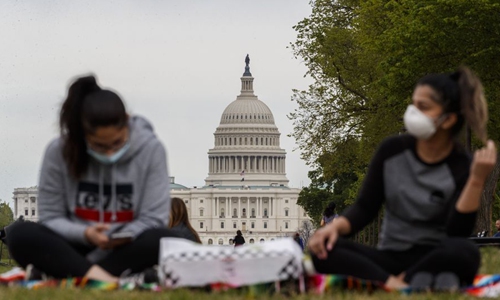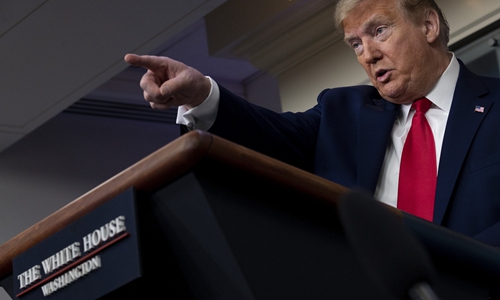US lawsuit against China a political scheme, ‘no chance to win’
‘China-bashing’ litigation hurts a suffering world: expert

The US Capitol building is seen in Washington D.C. April 19, 2020.Photo:Xinhua
A real-life political farce is playing out in the hometown of famous American writer Mark Twain, a sharp critic of American democracy. Suing China as part of a choreographed "Blame China" campaign led by American hawks like Missouri Attorney General Eric Schmitt is one of the common tactics being used, as long-term anti-China political elites see Beijing's rising status as the biggest obstacle to "making America great again," observers said.
Missouri became the first US state to file a lawsuit against the Chinese government for its handling of the novel coronavirus pneumonia (COVID-19) outbreak, even though it doesn't have any grounds to sue due to sovereign immunity.
Such move came along when some law firms in Republican states such as Florida and Texas have been pushing forward class action against China for unleashing the virus while some lawmakers such as Arizona senator Martha McSally and Tennessee lawmaker Marsha Blackburn trying to introduce the bill to remove China's sovereign immunity.
Some analysts also noted that just like Missouri, a place dubbed the "Show Me" State, Republicans should be ashamed of using groundless evidence for legal proceedings to achieve their goals in the November elections, especially when they clearly understand the case would be hard to proceed due to illegitimate and flawed procedures.
However, some politicians from Western countries, particularly major US allies, began parroting Washington's tone to blame China - a way to distract public attention from their own mishandling of the pandemic, which further exposed the vulnerability and lack of integrity in their foreign policies, as they are yielding to Washington's pressure amid the outbreak, analysts said.
'No chance'
In the lawsuit filed against Beijing, Eric Schmitt, Missouri Attorney General, who is also the plaintiff of the case, sued three ministries, the Chinese government, Communist Party of China, the provincial and municipal-level Hubei and Wuhan governments, as well as the Wuhan Institute of Virology and Chinese Academy of Sciences, according to the lawsuit document.
Some American law experts told the US media that the lawsuit will not succeed because the Foreign Sovereign Immunities Act of 1976 provides that "foreign states enjoy immunity from the civil jurisdiction of US courts," said Chimène Keitner, a law professor at UC Hastings College of Law, who wrote an article Don't Bother Suing China for Coronavirus. Some Chinese law experts who talked with the Global Times on Wednesday said there is no chance that "such a lawsuit will succeed."
"Aside from the absence of jurisdiction, the US also has no investigative powers," Yuan Zheng, a research fellow at the Chinese Academy of Social Sciences (CASS), told the Global Times on Wednesday. The court needs to have evidence to make a judgment, which requires an investigation, but it's impossible for China to let the US come to investigate. Who do they think they are?" Yuan asked.
It will be difficult to proceed with the lawsuit, as the Foreign Sovereign Immunities Act of 1976 extends immunity to countries from most lawsuits in the US. However, such immunity does not apply when it comes to commercial activities according to 1605(a)(2) of the Act, said Peng Qinxuan, an expert from the Wuhan University Institute of International Law.
While some American law experts also suggested that if the US wants to file charges against China, it would have to do so in the international court. Peng told the Global Times that countries would settle an international dispute at an international tribunal when an pre-agreement between them specifically provides so. But now there is no such preliminary agreement concerning the situation that grants jurisdiction to any international tribunal given the current status of China-US ties.
Schmitt blames those government agencies and institutions for "deceit, concealment, misfeasance and inaction" that unleashed this pandemic. However, almost all the 115 pieces of evidence listed as the nature of the action are from previous US media reports, including far-right US media outlet Fox News, which has long covered China in a biased way, and the Wall Street Journal, which published an opinion piece with racist headline defaming China amid the outbreak, sparking wide-ranging criticism over the arrogance, prejudice and ignorance of Western mainstream media.
Even more ironically, the document cited nine articles from American right-wing opinion-driven magazine National Review as major sources, or in other words, so-called "evidence" to prove China's missteps that fueled the COVID-19 spread. Some of those reports hyped the virus as being manmade, and distorted facts. For instance, Fox News claimed it was leaked from the Wuhan Institute of Virology, which contradicted scientists and medical experts' evaluation of the virus when the World Health Organization confirmed that available evidence shows the virus originated in animals and was not created in a laboratory.
The Federal Rules of Evidence Rule 802 states that the rule against hearsay is not admissible, except by rules laid down by federal statutes or the Supreme Court.
The media reports enumerated in the indictment are not exceptions to the rule of hearsay evidence and should not be admitted as evidence by the court based on relevant rules, Zhang Qihuai, an attorney from the Beijing Lanpeng Law Firm, told the Global Times.
Also, none of the treaties addressing the international spread of infectious diseases dating back to the 19th century have rules requiring payment of compensation for damage in other countries associated with violations of treaty rules, David Fidler, visiting professor of law at Washington University in St. Louis, said in an article published on justsecurity.org in March. The leading contemporary treaty, the International Health Regulations (2005) (IHR), has no provisions on this issue, he said.
Geng Shuang, spokesperson of the Foreign Ministry, slammed the latest US lawsuit against China, claiming that the alleged accusation has no basis in fact or law and is ridiculous. "The sovereign actions taken by the Chinese government in the prevention and control of the coronavirus epidemic are not subject to the jurisdiction of the US courts," he said.
The US is filing lawsuits against China at federal and state level and may amend some legal provisions to facilitate the process of suing China. Once it wins at the federal level, it may provide a "legal" basis for US long-arm jurisdiction, Zhu Ying, deputy director of the National Human Rights Education and Training Base of Southwest University of Political Science and Law, told the Global Times on Wednesday.
The hyping of these lawsuits has political purposes and their legal basis is not practical. The virus is an invisible enemy, while China is visible. By filing these lawsuits, the US and some Western countries want to slander and isolate China, hyping the country as the origin of the virus and stirring up anti-China sentiments in the international community, Zhu noted.
Rather than a serious lawsuit, "Filing a lawsuit shows their political stance and shirks their responsibility, which is standard politics and democracy in the West," Yuan said.
On the Cotton and Crenshaw bill that aims to remove China's immunity from the US judiciary, experts suggested that China fight back by legislating on a reciprocal basis, which is, to remove US diplomatic immunity in China through an amended law by China's National People's Congress, which is more efficient than US legislature.

US President Donald Trump speaks during a Coronavirus Task Force press briefing at the White House in Washington, DC, on Sunday. Photo: AFP
'Blame China!'
Besides GOP hawks in the US, some politicians, influencers and media elites in countries like Australia, UK, and Germany have been trying to follow similar anti-China rhetoric, blaming China for COVID-19 outbreaks and intensifying the political battle between the West and China. The latest move is part of a flurry of lawsuits in the West, using China as a scapegoat to advance their political agenda.
Australian Nationals MP George Christensen called for China to pay reparations on March 31 for the pandemic and urged an investigation into reports that the virus originated from a Wuhan laboratory. And in India, a complaint was jointly filed on April 4 by the All-India Bar Association and International Council of Jurists - two NGOs who share the same president - and submitted it to the United Nations Human Rights Council (UNHRC). They are demanding that China pay $22 billion in compensation for China's alleged "legal responsibility" in the pandemic.
The case also alleged the novel coronavirus was leaked by the Wuhan Virology Institute.
"Australia has been echoing the panda-bashing rhetoric from Washington's campaign to smear and incriminate China. Such blind alignment with the anti-China crusade follows the so-called Western value, without any regard of reason and righteousness, and is basically against Australia's own national interest," Chen Hong, a professor and Director of Australian Studies Centre of East China Normal University, told the Global Times on Wednesday.
British foreign policy think-tank Henry Jackson Society released a report on April 5 claiming China should be responsible for the huge £3.2 trillion ($3.9 trillion) loss of G7 nations, including the UK, US and Japan from the pandemic.
The "China-bashing" complaint led by Indian lawyer Adish Agarwala to the UNHRC was recently slammed by some Indian legal experts who also questioned its motives.
"There is no official backing to his complaint and it is a publicity stunt … it is extremely tragic and shameful that some individuals are exploiting such a human crisis for cheap publicity," Prashant Kumar, a former president of LAWASIA (The Law Association for Asia and the Pacific), said in a public message. "There is no backing from the Indian government or any recognized body."
Also, Bild, Germany's largest newspaper, recently listed a "bill" that China needs to pay for the coronavirus outbreak in Germany. Julian Reichelt, the editor-in-chief of the newspaper, made a video maliciously attacking China.
From the offensive rhetoric used in defending his claims, Reichelt showed no sympathy to coronavirus patients and casualties without the goodwill for global solidarity, observers said. And what he focused on was self-promotion by stirring up confrontation between the West and China, which is a typical nasty move amid the turbulent moment and a shame to German media.
Ni Feng, deputy director of the Institute of American Studies of the Chinese Academy of Social Sciences, told the Global Times that the move is mostly a political manipulation aimed at scapegoating China and winning votes or shifting the blame rather than a real claim for compensation.
"These politicians know that legal action will attract public attention, especially at such a critical moment and given the tough epidemic situation in their countries," Ni said, noting that judicial procedures will take a very long time, giving them a long time to play their game.
Still, others have urged global solidarity in fighting the pandemic, which has caused more than two million cases globally, warning against misinformation that can have fatal consequences.
"With the scale and reach of the pandemic increasing exponentially, there is an urgent need to establish practices to effectively disseminate current, accurate information and quickly identify and root out outdated guidance or misinformation," digital medical journal The Lancet said on Tuesday.
"I have never seen any country as shameless as the US," a Chinese netizen said on Weibo on Wednesday in response to the lawsuit.
"Countries like Australia should stop parroting the US. Otherwise, they would always be Washington's lapdog," another netizen said.